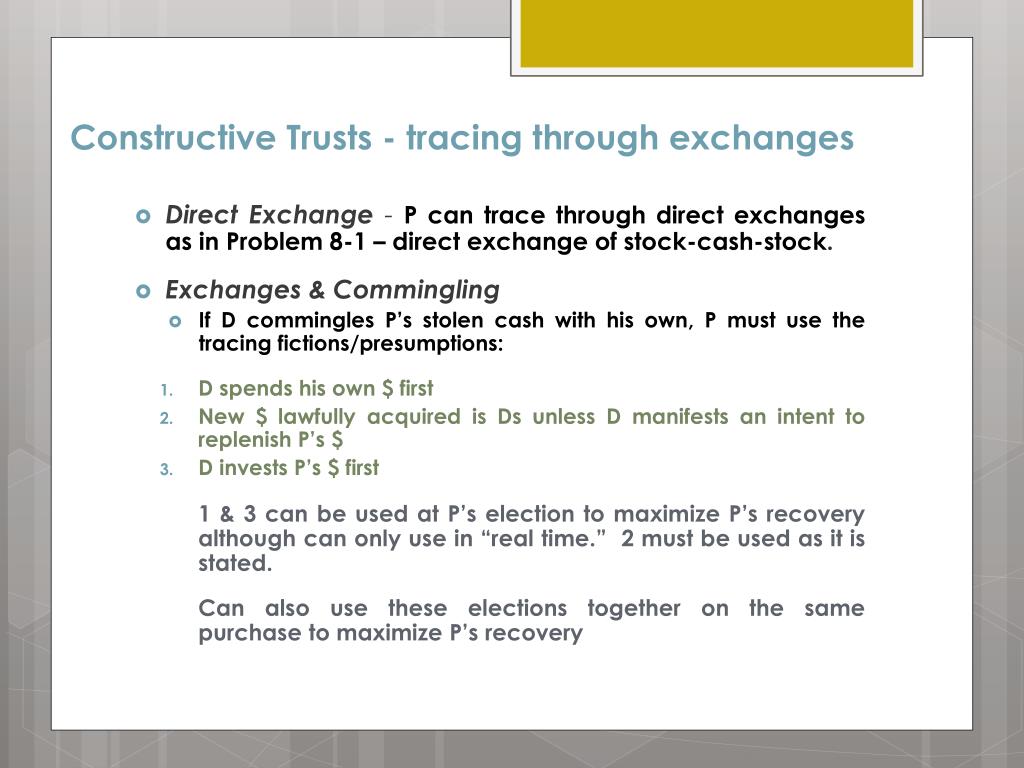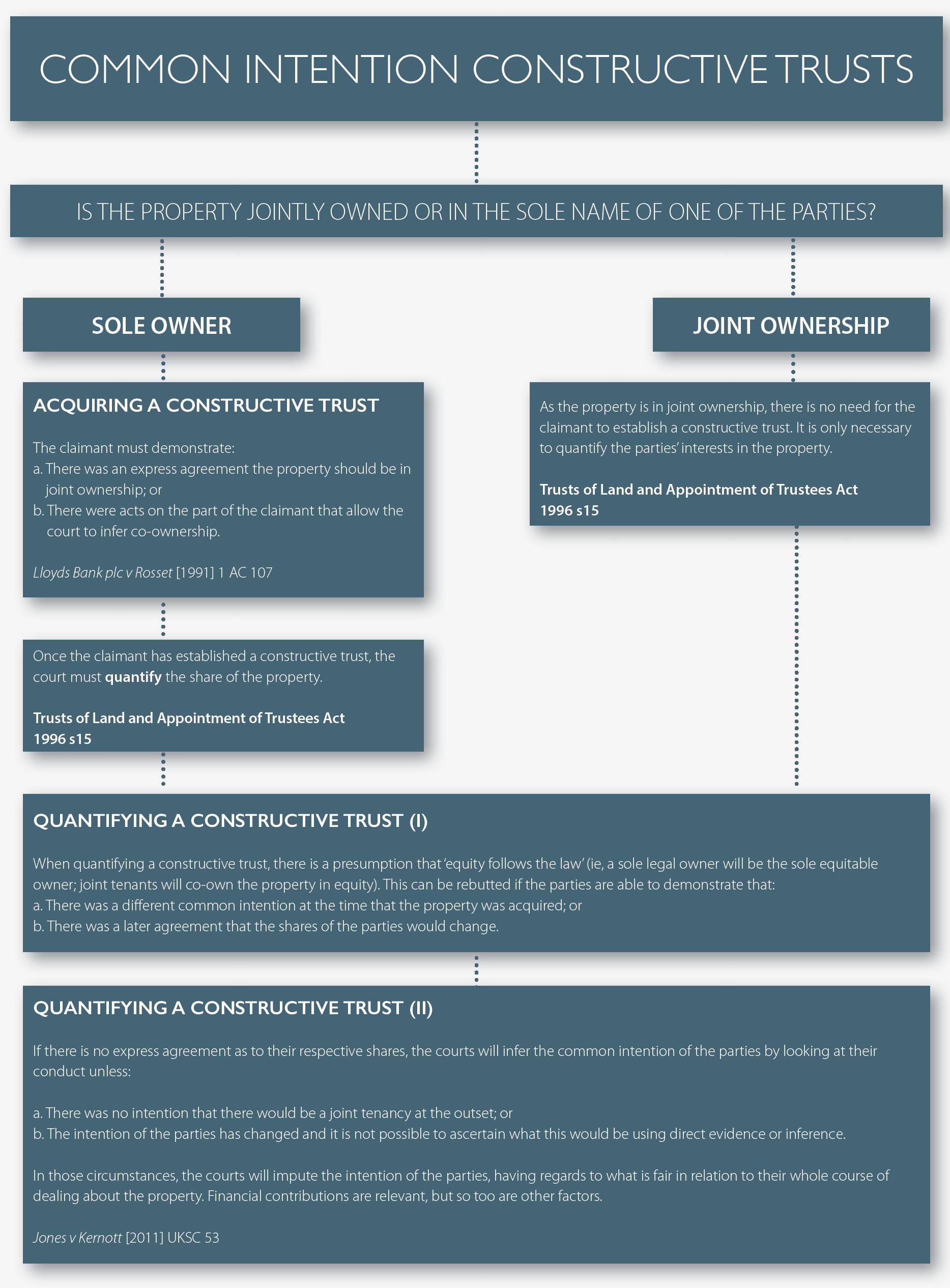Checking out Exactly How Does a Useful Depend On Operate In Residential Property and Property Disputes
The principle of a useful trust fund offers as an essential device within residential property and possession conflicts, dealing with situations where one event has unjustly benefited at the expense of one more. By examining the subtleties of how useful depends on run, one can discover the intricacies that frequently arise in legal contexts.

Interpretation of Constructive Count On
A positive count on emerges when a court identifies that it is essential to stop unjustified enrichment, typically in scenarios where a party has actually acquired residential property through wrongful ways or under conditions that require fair alleviation. This legal treatment is not officially established by the celebrations entailed; instead, it is imposed by the court to attend to circumstances where justness and justice demand intervention.
Useful trust funds are often conjured up in instances involving scams, violation of fiduciary task, or other types of misconduct. If an individual wrongfully takes belongings of residential or commercial property that truly belongs to an additional, the court may impose a constructive depend on to ensure that the criminal holds the home for the advantage of the rightful proprietor. This legal concept operates the concept that it would be inequitable for the perpetrator to keep the benefits originated from their transgression.
Inevitably, a useful count on works as an effective tool in home disputes, enhancing the idea that ownership need to show not just legal title but additionally ethical factors to consider. By acknowledging the need for fair relief, courts make certain that justice dominates in the distribution of residential or commercial property and assets.
Trick Concepts of Useful Depends On
While the application of positive trusts may differ depending upon specific situations, several key concepts regularly underpin their enforcement in residential or commercial property disagreements. The concept of unjust enrichment plays an essential role; a useful trust is typically enforced to prevent one celebration from unjustly profiting at the expense of one more. This principle highlights the fair nature of positive counts on, highlighting that lawful possession does not constantly relate to rightful possession.
Second of all, the need of a fiduciary relationship is significant. What Is A Constructive Trust. Constructive counts on often develop in contexts where one event has an obligation to act in the very best interests of another, such as in partnerships or joint ventures. Breaches of this duty can set off the imposition of a positive trust to safeguard the aggrieved party's passions
In addition, the teaching of intent is crucial, as courts take into consideration whether the events planned to produce a trust-like connection, even if not formally documented. Finally, the principle of fair treatments highlights that useful counts on offer to give alleviation that lines up with fairness and justice, ensuring that the rightful complaintant can reclaim property or assets that they are qualified to, despite legal title staying somewhere else.
Applications in Building Conflicts
Positive counts on locate significant application in building disputes, especially when addressing problems of possession and fair rights. These depends on arise in conditions where one party holds building under conditions that, in fairness and justice, ought to profit an additional party. The equitable treatment of a positive count on stops unjustified enrichment by recognizing the contributions of a celebration that, despite lacking official title, has a genuine case to the home.
One common situation involves cohabiting partners who add to the Discover More Here purchase or maintenance of home however are out the title deed. In such cases, the courts may enforce a constructive depend on to mirror the parties' objectives and contributions, thus making certain that the non-titled companion obtains a reasonable share of the building.
In addition, useful depends on can be vital in conflicts involving inheritance or household home, where a decedent's intent may not have been officially documented. Courts may presume a useful trust to recognize the decedent's dreams and correct potential injustices among heirs. On the whole, useful trusts act as an essential device in balancing civil liberties and making sure equitable results in residential property disputes, enhancing the principle that fairness need to prevail in possession matters.
Study and Examples
Residential or commercial property conflicts involving positive depends on can commonly be shown with real-life case researches that highlight the intricacies and nuances of fair civil liberties. One remarkable situation is * Gissing v. Gissing *, where a partner claimed a useful interest in the family members home, suggesting that her monetary contributions during the marriage necessitated a positive trust. The court ultimately regulationed in her favor, developing that her payments developed a fair passion in spite of the home being only in her other half's name.
One more illustrative situation is * Thompson v. Thompson *, where brother or sisters disputed the ownership of a household estate after their parents' passing. One brother or sister had actually kept and boosted the property, asserting that these actions justified a constructive count on. The court acknowledged the sibling's efforts and discovered that a useful count on was needed to stop unfair enrichment, therefore awarding them a share in the estate.
These situations exemplify how constructive counts on serve to deal with circumstances where legal possession does not mirror the real fair interests of the parties involved, emphasizing the significance of intent and contributions in figuring out rightful insurance claims in building disputes.
Legal Effects and Considerations
Numerous legal effects and considerations develop when addressing useful rely on residential property disputes. Foremost, the establishment of a constructive depend on generally hinges on the presence of an unjustified enrichment, in which one party benefits at the cost of an additional. This principle requires a comprehensive exam of the connection in between the events and the scenarios that resulted in the claimed injustice.
Additionally, courts usually require clear evidence of the plaintiff's payment to the residential or commercial property or possession concerned, which can consist of economic investments, labor, or other types of support. The concern of proof resides the plaintiff, demanding precise paperwork and testament to corroborate their insurance claims.
Additionally, the timing of insurance claims is crucial, as statutes of constraints might Find Out More limit the capability to establish a constructive trust fund after a particular duration. Legal advice should navigate these time constraints thoroughly to guarantee that claims are filed in a prompt fashion.
Lastly, the potential for conflicts over the intent behind building transfers can make complex issues better, necessitating a nuanced understanding of both statutory legislation and situation legislation to successfully advocate for a customer's rate of interests in useful depend on insurance claims.
Final Thought

The concept of a useful depend on offers as an important device within residential or commercial property and possession disagreements, addressing circumstances where one party has actually unjustly benefited at the cost of an additional. If a private wrongfully takes possession of property that truly belongs to an additional, the court might enforce a useful depend on to make certain that the perpetrator holds the property for the benefit of the rightful proprietor.Useful trust funds discover substantial application in building disagreements, particularly when resolving issues of ownership and equitable legal rights. On the whole, positive trusts serve as a crucial device in balancing civil liberties and ensuring equitable results in property conflicts, enhancing the principle that fairness must dominate in ownership issues.
In recap, positive counts on offer as vital fair treatments in building and possession more disputes, resolving unjustified enrichment by acknowledging the contributions of parties involved. - What Is A Constructive Trust
Comments on “How Judges Decide in Determining What Is A Constructive Trust in Property Cases”